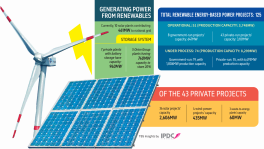G7 can spearhead climate fight by agreeing to phase out coal: Germany

The Group of Seven countries can spearhead the fight against climate change and accelerate a pivot away from fossil fuels by agreeing to phase out coal power generation, Germany's economy minister Robert Habeck said on Thursday.
Habeck was speaking as G7 energy, climate and environment ministers were set to wrangle over how to keep climate change goals on track at talks overshadowed by spiralling energy costs and fuel supply worries sparked by the war in Ukraine.
The conflict triggered a scramble among some countries to buy more non-Russian fossil fuels and burn coal to cut their reliance on Russian supplies, raising fears that the crisis could undermine efforts to fight climate change.
Habeck said finding alternative fossil fuels would not come at the expense of environmental goals. Instead, the energy emergency and high inflation should be the "first step to quickly exit fossil fuel energy altogether".
There would be intensive discussions this week on how the G7 could take on the role as a "pioneer to bring about an exit from coal power generation" and in decarbonisation, he said.
A draft communique, seen by Reuters ahead of the May 25-27 talks, showed the group will consider committing to a phase-out of coal by 2030, though sources suggested that opposition from the United States and Japan could derail such a pledge.
The draft, which could change considerably by the time talks conclude on Friday, would also commit G7 countries to have a "net zero electricity sector by 2035" and to start reporting publicly next year on how they are delivering on a past G7 commitment to end "inefficient" fossil fuel subsidies by 2025.
"We need to accelerate dramatically. We cannot fall into this false narrative that because of Ukraine there is now an excuse to have to go pump out and build an entire new generation of infrastructure," said the U.S. climate envoy John Kerry.
"That will be catastrophic, unless it comes with all of the mitigation and abatement, the capturing of emissions."
Campaigners had urged the G7 group of the world's wealthiest democracies to make clear commitments that the fallout of the Ukraine war would not derail their targets.
"We have a new reality now. The G7 need to respond to that, and they should respond through renewables, and not through fossil fuel infrastructure," said David Ryfisch, climate policy expert at non-profit Germanwatch.
While seeking consensus on an oil embargo on Russia, the European Union is pushing to accelerate the bloc's pivot to renewable energy while finding fossil fuel alternatives to Russian supplies.
"As G7 ministers, we have to send a clear message that we agree here in Berlin that our green transition remains our priority," said EU energy commissioner Kadri Simson.
"I do expect that today with colleagues we will see and we will agree how we can deliver our green agenda. How we can stabilize global energy markets and send a clear message to Russia together."


 Keep updated, follow The Business Standard's Google news channel
Keep updated, follow The Business Standard's Google news channel















